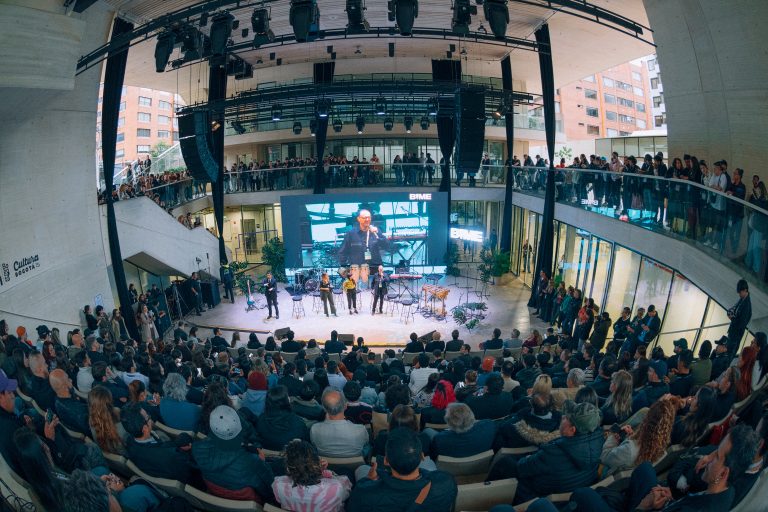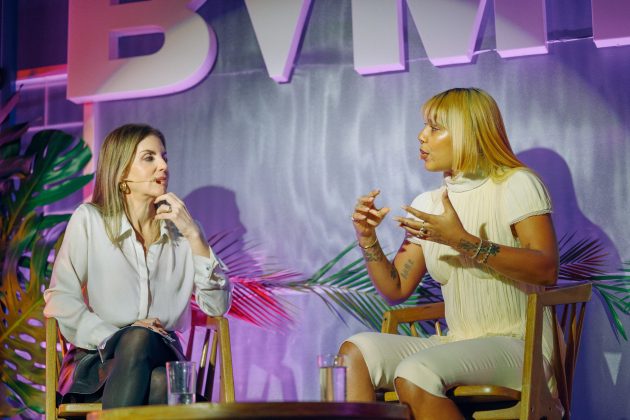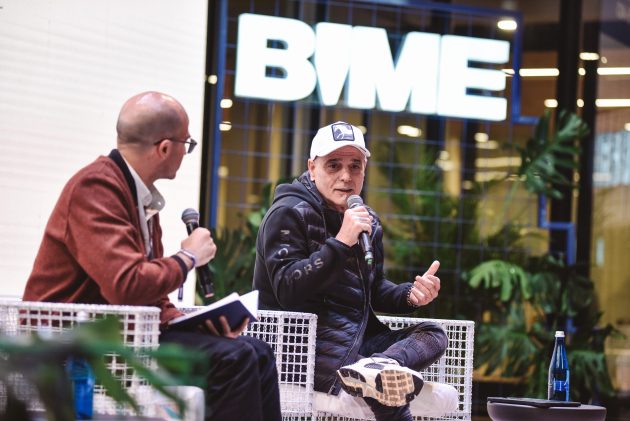
BIME Bogotá: Voices Carving Latin Music’s Next Chapter
27 June, 2025This year’s BIME Bogotá was less about spectacle and more about substance. In between panels, one-on-one conversations, and the quiet hum of cultural exchange, a deeper narrative emerged: one of artists reclaiming space, memory, and voice in a fast-changing global landscape.
Among the standout moments were two pillars in Latin music’s current state of affairs: Dominican rapper Tokischa’s vulnerable dialogue on survival and creative sovereignty, and the presence of Zeta Bosio, whose reflections reminded us that before the industry came infrastructure; there was just the music and the will to carry it.
While we weren’t able to attend the artist showcases or live performances this year, our focus stayed rooted in these stories that carry long after the final note: the shared knowledge, strategic insights, and lived experience shaping Latin music’s direction, both at home and across borders.
Tokischa: Radical Honesty and the Return to Self

When Dominican artist Tokischa sat down with Billboard’s Leila Cobo at BIME Bogotá, the stage became a confessional of spiritual clarity.
Known by many for her confrontational lyrics and unapologetic image, she offered something more elemental: the story of an artist returning to her roots, to her essence. “I’ve felt like the sun”, she said, referring to both her 2024 track “SOL” and a wider personal awakening. “Because I’ve brought light to the people I love”.
That sense of illumination, the light that follows the dark, now guides her mission: not just to make music, but to offer knowledge, care, and structural support to other artists walking uncertain paths.
Her upcoming full-length debut, still untitled, traces three chapters of inner transformation: survival, liberation, and sovereignty. But more than a concept album, it’s a return to the voice she almost lost. “I went back to the roots,” she said. “To who I was before the noise.”
Tokischa spoke candidly about growing up between households, financial hardship, and the fragmented conditions that shaped her early life. She recalled her time in call centers, using whatever income she could gather to fund her creative drive. She was honest, too, about the stigmatized forms of work that enabled her independence, despite being often erased in sanitized music bios, yet central to her story and sound.
When asked why she doesn’t tone things down for mainstream comfort, she answered simply: “If I change that to make people comfortable, then I’m betraying myself.”
There was defiance in her words, but also care. In speaking of her mother, Tokischa lit up. She spoke with pride about buying her sewing machines, plants, and eventually a home in Santo Domingo. “She’s my queen,” she said. “Everything I am is because of her.”
Later, when a young audience member asked how to remain true in an industry full of judgment, Tokischa’s response was clear: “Know yourself. Respect your intuition. Love your truth. And never let the noise outside drown out the voice inside.”
She closed with an unreleased track—vulnerable, stripped-down, and meditative. It felt less like a performance, more like a parting prayer. If this is a new era for Tokischa, it’s not one of reinvention, but rather one of return.
Zeta Bosio: Legacy, Reinvention, and the Long Echo of Latin Rock

One of the most resonant moments at BIME Bogotá came not from the cutting-edge, but from the foundation. When Zeta Bosio, legendary bassist, producer, and co-founder of Soda Stereo, took the stage in conversation with traditional local rock station Radioacktiva’s Julio César Escovar, the room settled into something more than a talk. It became a kind of oral history. Part memory, part roadmap, deeply woven with the spirit of Latin American rock.
Zeta, ever the thinker-musician, opened by reminding us of music’s dual nature: part science, part spell. “What music produces in us goes beyond explanation,” he said, speaking less as a performer and more as a translator of vibration into meaning.
Before Soda: Cassettes, Ritual, and Sonic Hunger
Long before Soda Stereo electrified a continent, Zeta was a teenager discovering vinyl like sacred relics. “Listening to an album was like watching a movie,” he said. Albums weren’t just played. They were passed hand to hand, shared through whispered recommendations, smuggled through borders, or copied onto tapes passed around like coded messages. It was a time of scarcity, and that scarcity shaped sound.
He and Cerati were music pilgrims, exchanging cassettes, studying the textures of Duran Duran, The Police, and U2—sonic references that would eventually shape their own voice. “If everyone had access to what we were listening to, maybe Soda wouldn’t have sounded so new,” Zeta mused. Isolation, in that sense, became innovation.
Building the Circuit, Not Just the Songs
What Soda did went beyond recordings. They helped imagine a regional live music circuit where none existed. From school gymnasiums in Bogotá with busted speakers to the mythic stages of Viña del Mar, they mapped out what touring Latin rock could be. “We had to invent that map,” Zeta said. And they did it by refusing to compromise their language, even when tempted by major labels to switch to English. “We tried two songs in English. They lost something essential.”
The Studio as Site of Struggle and Liberation
Zeta recalled the triumphs and frustrations of working within the limitations of Argentine studios. Crackling cables, outdated gear, inconsistent engineers. But instead of giving in, Soda took the reins. Albums like Dynamo and Sueño Stereo were born from this defiance: experimental, expansive, and fiercely local in spirit. “We told the labels: if you won’t take care of your studio, we’ll go find a better one.”
Beyond Soda: Festivals, Bridges, and Cultural Stewardship
When Soda disbanded, Zeta didn’t retreat. He reinvented himself as a connector. He championed new artists, produced TV shows like Rock Road to bring European festival culture into Latin American living rooms, and helped shape events like Quilmes Rock and Personal Fest—now staples of Argentina’s live scene.
He became a bridge, one who carried the legacy of Latin rock forward without letting it calcify. Even now, his DJ sets remix classic Latin tracks into live reinterpretations, keeping the pulse alive. “I get to play bass, mix the songs I love, and reintroduce them to new ears,” he said. His goal was not to repeat the past, but to keep it moving.
Legacy as a Living Practice
Again and again, Zeta returned to the idea that Soda Stereo wasn’t just a band. “It was a way of doing things. A method. A world.” That world continues today in projects like Gracias Totales, the 2020 tribute tour that kept Soda’s spirit alive during the pandemic, and a still-secret 2025 initiative that hints at new sonic offerings.
When asked what it felt like to play these songs again, he was honest: “I’m 60. I thought—am I really going to die without playing these songs live again? That wasn’t an option.”
And the impact of their work still transcends language. “A fan once told me, ‘We don’t know what you’re saying, but we feel it’.” That’s the essence of musical transmission. What can’t be translated, but can always be felt.
“The Rockstar Is Vintage Now”
Zeta was blunt when asked about the future of Latin rock: “It’s not the rebellion anymore. It’s the craft.” In a world led by reggaetón, trap, and viral algorithms, he sees rock not as dead, but as sacred. “It’s like analog photography or vinyl. You feel the warmth. You feel the touch.”
He praised a new generation—Argentine bands such as Conociendo Rusia, Usted Señálemelo, Bándalos Chinos—for refusing formula and choosing exploration. “They’re making pop-rock, psych, funk, without fear. That’s what matters.”
Success, he noted, has changed. “Before, you chased radio. Now it’s TikTok. A clip can revive a forgotten band in a day.” He called it “beautiful chaos”, a new world where legacy and novelty collide, often without warning.
On AI, Algorithms, and Staying Human
Zeta’s take on artificial intelligence was grounded, not alarmist. “AI is here. Not using it doesn’t make you pure. Just stubborn.” But he also warned against the erasure of the human feel. “What we used to build over weeks is now abandoned in an afternoon. That speed comes at a cost.”
In today’s fragmented music world, he believes the answer isn’t mass appeal, but rather tribe-building. “Find your people. Don’t chase everyone.”
A Closing Note for New Artists
Zeta left the younger generation with this:
“Originality wins. Don’t try to be correct. Try to be unforgettable. We had the advantage that no one knew what we were copying. You don’t have that now. So make sure no one can confuse you for anyone else.”
In closing, the voices at BIME Bogotá didn’t just react to trends. They reclaimed the frameworks. From artists like Tokischa who embody resistance and rebirth, to veterans like Zeta who remind us that legacy is a practice, not a past, one thing was clear:
Latin music isn’t looking for a place at the table. It’s building its own house, full of sound, soul, and the stories that are just beginning to be told. For the time being, stay tuned for more coverage on Colombia and the vibrant, ever-evolving music scenes emerging across Latin America. This is just one chapter in a much larger story, and we’re here to keep telling it.
Follow Sounds and Colours: Facebook / Twitter / Instagram / Mixcloud / Soundcloud / Bandcamp
Subscribe to the Sounds and Colours Newsletter for regular updates, news and competitions bringing the best of Latin American culture direct to your Inbox.

